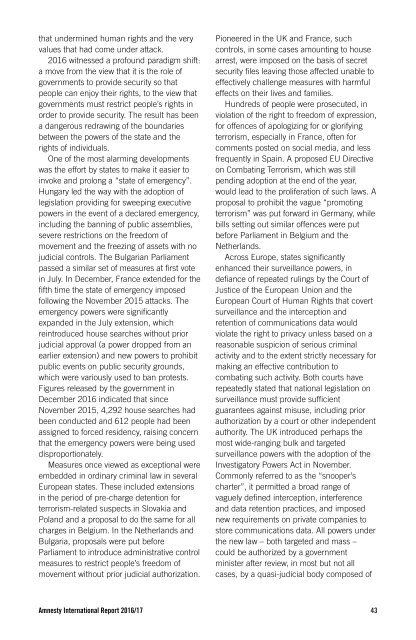AMNESTY INTERNATIONAL REPORT 2016/17
2lEHU9j
2lEHU9j
Create successful ePaper yourself
Turn your PDF publications into a flip-book with our unique Google optimized e-Paper software.
that undermined human rights and the very<br />
values that had come under attack.<br />
<strong>2016</strong> witnessed a profound paradigm shift:<br />
a move from the view that it is the role of<br />
governments to provide security so that<br />
people can enjoy their rights, to the view that<br />
governments must restrict people’s rights in<br />
order to provide security. The result has been<br />
a dangerous redrawing of the boundaries<br />
between the powers of the state and the<br />
rights of individuals.<br />
One of the most alarming developments<br />
was the effort by states to make it easier to<br />
invoke and prolong a “state of emergency”.<br />
Hungary led the way with the adoption of<br />
legislation providing for sweeping executive<br />
powers in the event of a declared emergency,<br />
including the banning of public assemblies,<br />
severe restrictions on the freedom of<br />
movement and the freezing of assets with no<br />
judicial controls. The Bulgarian Parliament<br />
passed a similar set of measures at first vote<br />
in July. In December, France extended for the<br />
fifth time the state of emergency imposed<br />
following the November 2015 attacks. The<br />
emergency powers were significantly<br />
expanded in the July extension, which<br />
reintroduced house searches without prior<br />
judicial approval (a power dropped from an<br />
earlier extension) and new powers to prohibit<br />
public events on public security grounds,<br />
which were variously used to ban protests.<br />
Figures released by the government in<br />
December <strong>2016</strong> indicated that since<br />
November 2015, 4,292 house searches had<br />
been conducted and 612 people had been<br />
assigned to forced residency, raising concern<br />
that the emergency powers were being used<br />
disproportionately.<br />
Measures once viewed as exceptional were<br />
embedded in ordinary criminal law in several<br />
European states. These included extensions<br />
in the period of pre-charge detention for<br />
terrorism-related suspects in Slovakia and<br />
Poland and a proposal to do the same for all<br />
charges in Belgium. In the Netherlands and<br />
Bulgaria, proposals were put before<br />
Parliament to introduce administrative control<br />
measures to restrict people’s freedom of<br />
movement without prior judicial authorization.<br />
Pioneered in the UK and France, such<br />
controls, in some cases amounting to house<br />
arrest, were imposed on the basis of secret<br />
security files leaving those affected unable to<br />
effectively challenge measures with harmful<br />
effects on their lives and families.<br />
Hundreds of people were prosecuted, in<br />
violation of the right to freedom of expression,<br />
for offences of apologizing for or glorifying<br />
terrorism, especially in France, often for<br />
comments posted on social media, and less<br />
frequently in Spain. A proposed EU Directive<br />
on Combating Terrorism, which was still<br />
pending adoption at the end of the year,<br />
would lead to the proliferation of such laws. A<br />
proposal to prohibit the vague “promoting<br />
terrorism” was put forward in Germany, while<br />
bills setting out similar offences were put<br />
before Parliament in Belgium and the<br />
Netherlands.<br />
Across Europe, states significantly<br />
enhanced their surveillance powers, in<br />
defiance of repeated rulings by the Court of<br />
Justice of the European Union and the<br />
European Court of Human Rights that covert<br />
surveillance and the interception and<br />
retention of communications data would<br />
violate the right to privacy unless based on a<br />
reasonable suspicion of serious criminal<br />
activity and to the extent strictly necessary for<br />
making an effective contribution to<br />
combating such activity. Both courts have<br />
repeatedly stated that national legislation on<br />
surveillance must provide sufficient<br />
guarantees against misuse, including prior<br />
authorization by a court or other independent<br />
authority. The UK introduced perhaps the<br />
most wide-ranging bulk and targeted<br />
surveillance powers with the adoption of the<br />
Investigatory Powers Act in November.<br />
Commonly referred to as the “snooper’s<br />
charter”, it permitted a broad range of<br />
vaguely defined interception, interference<br />
and data retention practices, and imposed<br />
new requirements on private companies to<br />
store communications data. All powers under<br />
the new law – both targeted and mass –<br />
could be authorized by a government<br />
minister after review, in most but not all<br />
cases, by a quasi-judicial body composed of<br />
Amnesty International Report <strong>2016</strong>/<strong>17</strong> 43


